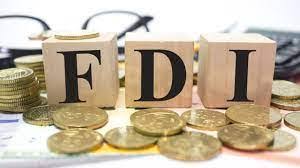Nigeria posts surplus inflows
Foreign investors appear more active and showing stronger interest in the Nigerian investment market as more foreign inflows transited the country from deficit to surplus investment status.
Latest trading data on foreign portfolio investments (FPI) released at the weekend indicated that foreign transactions have risen, both in proportion and the positive direction of flows. The comparative positive trends also applied to both recent months and a long-view comparison with the previous year.
The report showed that total foreign transactions in the past 10 months had risen to N349.59 billion compared with N329.62 billion recorded in the comparable period of 2021. Foreign portfolio inflows were higher at N178.21 billion as against outflows of N171.38 billion in 2022, indicating a surplus position. These compared with deficit position in corresponding period of 2021 when foreign outflows of N173.32 billion outweighed inflows of N156.3 billion.
The report indicated that Nigeria has been having positive FPI position over the past three months. Total transactions rose from N19.67 billion in September 2022 to N28.55 billion in October 2022. Foreign inflows had increased from N10.08 billion in September 2022 to N18.16 billion in October 2022 while outflows inched up from N9.59 billion to N10.39 billion.
The FPI report, coordinated by the Nigerian Exchange (NGX), included transactions from nearly all custodians and capital market operators and it is widely regarded as a credible measure of FPI trend. The report uses two key indicators-inflow and outflow, to gauge foreign investors’ mood and participation in the stock market and the economy. While inflows and outflows indicate direction of portfolio transactions, total FPI measures the momentum and level of participation.
When inflows outweigh outflows, it simply means foreign investors are buying more investments than they are selling and when outflows outpace inflows, it implies that foreign investors are selling more of their investments than buying more investments. Thus the position of FPI surplus or deficit.
The increased level of activities and return to positive position represent a recovery for the Nigerian market, after a long period of decline. Market analysts however remained cautious over the outlook, citing macroeconomic and political risks.
In August 2022, total FPI transactions had stood at N28.21 billion with inflows and outflows of N15.78 billion and N12.43 billion respectively.
A seven-month analysis had shown that total FPIs stood at N273.16 billion by July 2022 as against N237.49 billion recorded in the comparable period of 2021. The seven-month analysis mirrored performance in the first half which was buoyed by upbeat recorded in the early second quarter. Total transactions by foreign portfolio investors during the first half of 2022 had risen by 9.7 per cent to N243.48 billion compared with N221.96 billion recorded in first half of 2021.
The report had indicated that foreign inflows rose from N105.24 billion in first half 2021 to N120.51 billion in first half 2022. Foreign outflows had however also increased from N116.72 billion to N122.97 billion. Proportionate analysis meanwhile indicated faster growth in inflows than outflows, despite the fact that the base figures were almost within same range. While foreign inflows rose by 14.5 per cent, foreign outflows were slightly over a third with 5.36 per cent growth.
First quarter 2022 FPI report had shown decline in both the actual value and the proportionate participation of foreign investors in the Nigerian stock market. Foreign investors’ net participation also remained negative with more outflows than inflows, although the gap narrowed.
Total transactions by FPIs during the first quarter ended March 31, 2022 stood at N128.91 billion, 14.2 per cent or N21.3 billion below N150.23 billion recorded in comparable period of 2021. The proportionate participation of FPIs in the Nigerian stock market dropped by nearly four percentage points from 22.21 per cent in first quarter 2021 to 18.62 per cent in first quarter 2022.
A breakdown of the FPIs indicated country deficit, although the gap between inflows and outflows narrowed considerably. Total FPI inflows stood at N55.33 billion as against outflows of N73.58 billion in first quarter 2022. These compared with N60.11 billion and N90.12 billion recorded as inflows and outflows respectively in first quarter 2021.
FPIs in Nigerian stock market had dropped consecutively to lowest levels in recent years. FPIs had dropped by 40.4 per cent in 2021 to its lowest level in five years. Active participation of foreign investors in Nigerian market declined by 11 percentage points from about 34 per cent of total market transactions in 2020 to about 23 per cent in 2021.
The full-year FPI report had also shown a significant deceleration in FPI transactions and it was the main reason for the 12.4 per cent decline in turnover of activities at the Nigerian stock market in 2021.
Total foreign transactions in Nigerian equities declined to N434.50 billion in 2021 as against N729.20 billion recorded in 2020. Consequently, the percentage participation of FPIs in total market transactions dropped from 33.63 per cent in 2020 to 22.88 per cent in 2021.
The report had, however, shown admirable improvement in the overall FPI deficit as the gap between inflows and outflows narrowed considerably in 2021 compared with 2020, although the country had continued with negative FPIs flow.
FPI inflows and outflows stood at N204.88 billion and N229.62 billion respectively in 2021, indicating a deficit of N24.74 billion. These compared with inflows and outflows of N247.27 billion and N481.93 billion respectively in 2020, and a deficit of N234.66 billion.
FPIs had also declined by 22.64 per cent to a four-year low to close 2020 at N729.20 billion as against N942.55 billion recorded in 2019. The decline in FPIs in 2020 counteracted the general increase in momentum of activities at the Nigerian stock market, which saw 12.45 per cent increase in total turnover value.
FPI reports had shown wider gap between foreign portfolio inflows and outflows, implying that foreign investors had divested more than two kobo for every kobo invested in 2020, the worst deficit in recent years.
Total FPIs had increased from N1.208 trillion in 2017 to N1.219 trillion in 2018, before dropping by 22.72 per cent to N942.55 billion in 2019.
Nigeria recorded FPI deficit of N234.66 billion in 2020, about 125 per cent increase on N104.3 billion recorded in 2019. This implied that foreign investors divested more than two kobo for every kobo invested in 2020. FPI deficit had stood at N66.3 billion in 2018.
The reports had also shown that the quantum of transactions by foreign investors relative to total transactions at the Nigerian market decreased from about 49 per cent of total activities in 2019 to about 34 per cent in 2020. Foreign portfolio inflows stood at N247.27 billion as against outflows of N481.93 billion in 2020. Inflows and outflows had stood at N419.13 billion and N523.42 billion respectively in 2019.
Nigeria’s FPI had slipped into negative with a net deficit of N66.2 billion in 2018 after a world-leading stock market rally left the country with a surplus of N336.94 billion in 2017. Total foreign inflows in 2018 stood at N576.45 billion compared with outflows of N642.65 billion. Foreign inflows had in 2017 outpaced outflows at N772.25 billion and N435.31 billion respectively.
SOURCE: THENATION






